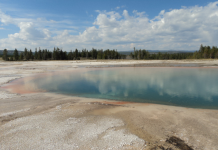A new species of wasp, named Syntretus perlmani, has been discovered in the United States, particularly noted for its gruesome method of reproduction that has drawn comparisons to science fiction horror, specifically reminiscent of the xenomorph from the “Alien” franchise.
Here are a few of the interesting things about this particular Wasp:
This wasp species lays its eggs inside living, adult fruit flies. Upon hatching, the wasp larvae burst out of the fly’s abdomen, a behavior previously unseen in parasitoid wasps which typically target the immature stages of their hosts.
The discovery was somewhat accidental, made by researchers at Mississippi State University while they were examining fruit flies for parasitic worms. This wasp was first observed in a backyard in Mississippi, leading to further study and confirmation of its existence across the Eastern U.S.
This finding is significant because it adds to the understanding of biological processes, particularly in parasitism. It’s the first known wasp to infect adult flies, challenging previous norms in parasitoid wasp behavior.
While initially seen as horrifying, this wasp might play a role in controlling fruit fly populations, which could have broader ecological implications given fruit flies’ nuisance status and their role in pest control.
The discovery has garnered attention for its macabre nature, leading to discussions where it’s been dubbed the “horror wasp” due to its method of emerging from its host.
Scientists are keen to explore further, looking into its infection biology, ecology, and evolutionary history. This could offer insights into biological control methods or deepen our understanding of insect behavior and life cycles.
This discovery of a new species of Wasp not only captivates with its horror movie-like biological drama but also opens avenues for ecological research and potentially innovative pest control strategies. However, as with any new species, especially those with such dramatic interactions with other species, there’s a mix of fascination and concern about how it might integrate into existing ecosystems or affect agriculture.







